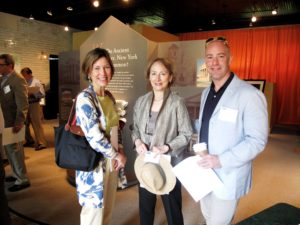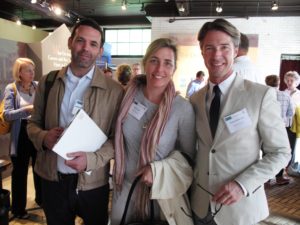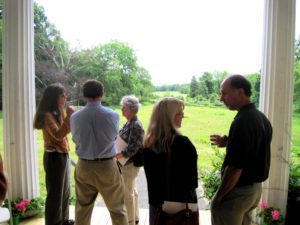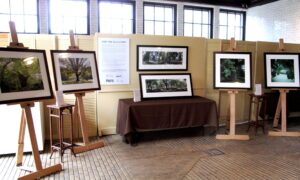 Conference examines Balancing Ecology & History as part of Stewardship and Role of Design in the Nature-Culture Divide
Conference examines Balancing Ecology & History as part of Stewardship and Role of Design in the Nature-Culture Divide
Washington, DC (May 3, 2011) – The Cultural Landscape Foundation (TCLF) and the Jay Heritage Center hosted Bridging the Nature-Culture Divide on Saturday, June 4, at the Jay Heritage Center. The national, one-day symposium, featured six leading figures in landscape architecture and environmental design and dynamically examined how cultural landscape stewardship balances competing agendas for ecology and history, and the role of design in this nature culture divide. The Jay Heritage Center, a National Historic Landmark site, is currently wrestling with these very issues in developing an effective stewardship plan making it an ideal location or “laboratory” for exploring such challenges. The symposium organizers aim to provoke discussion, push boundaries, and inspire solutions. Landscape Architecture Continuing Education System credits were offered for this event.
The Jay Estate, a 23-acre National Historic Landmark in Rye, New York, and the ancestral home of John Jay, New York’s only native Founding Father, sits adjacent to the 137-acre Marshland Conservancy. The Jay property has in recent years been deteriorating due to deferred maintenance and the proliferation of invasive plants. Six speakers—Cheryl Barton; Charles A. Birnbaum; Rick Darke; Patricia O’Donnell; Douglas Reed; and Thomas Woltz— presented broad history and ecology themes in cultural landscape stewardship to a public audience and community stakeholders; they highlighted issues specifically facing the Jay site; reviewed examples of other sites that successfully dealt with these issues; and addressed how present-day design solutions can respect and advance ecological and historic values.
 Speakers and topics:
Speakers and topics:
- Cheryl Barton, FASLA, FAAR, The Office Of Cheryl Barton, San Francisco, CA: Contested Landscapes: Ethics of Place;
- Charles Birnbaum, FASLA, FAAR, The Cultural Landscape Foundation: Symposium overview and facilitator of closing discussion;
- Rick Darke, Rick Darke LLC, Landenberg, PA: The Dynamic Nature of Cultural Landscapes;
- Patricia M. O’Donnell, FASLA, AICP, Heritage Landscapes LLC, Charlotte, VT and Norwalk, CT: The Jay Property & Marshlands Conservancy: Conflict & Balance for Cultural & Natural Values at a National Historic Landmark Property;
- Douglas Reed, FASLA, FAAR, Reed-Hilderbrand, Watertown, MA: Building the Case for Continuity and Change: Bennington College and the Clark Art Institute;
- Thomas Woltz, CLA, ASLA, Nelson Byrd Woltz Landscape Architects, Charlottesville, VA and New York, NY: Collaborative Design Process in Conflict Resolution in Historic, Agricultural, and Working Landscapes.
 A reception followed featuring TCLF’s Landslide 2010 “Every Tree Tells a Story” photography exhibition, with 26 images of 12 locations in the US and Puerto Rico. The exhibition is on view at the Jay Heritage Center through June 15, 2011.
A reception followed featuring TCLF’s Landslide 2010 “Every Tree Tells a Story” photography exhibition, with 26 images of 12 locations in the US and Puerto Rico. The exhibition is on view at the Jay Heritage Center through June 15, 2011.
The symposium was made possible by a grant from Con Edison, with additional support from City of Rye Sustainability Committee, New York Chapter of the American Society of Landscape Architects, New-York Historical Society, and Preservation League of New York State. 
About the Jay Heritage Center
The Jay Estate (www.jayheritagecenter.org) in Rye, New York, is the boyhood home of native New Yorker and Founding Father John Jay (1745-1829). Located next to a marshlands preserve with public trails, this sylvan and historic 23-acre park is all that remains of the original 400-acre Jay family estate where America’s first Chief Justice of the United States and negotiator of the Treaty of Paris grew up. Located just 35 minutes from Manhattan, the property has an 8,000-year-old scenic vista of Long Island Sound over a meadow bordered by sunken stone ha-ha walls, a European garden design feature added by Jay’s eldest son circa 1822. The site was designated a National Historic Landmark in 1993. The Jay Heritage Center is the non-profit steward of the park and holds educational programs in American History, Landscape Conservation and Environmental Stewardship there for the public.
About The Cultural Landscape Foundation
The 12-year old Cultural Landscape Foundation (www.tclf.org) provides people with the ability to see, understand, and value landscape architecture and its practitioners, in the way many people have learned to do with buildings and their designers. Through its Web site, lectures, outreach and publishing, TCLF broadens the support and understanding for cultural landscapes nationwide to help safeguard our priceless landscape heritage for future generations.
